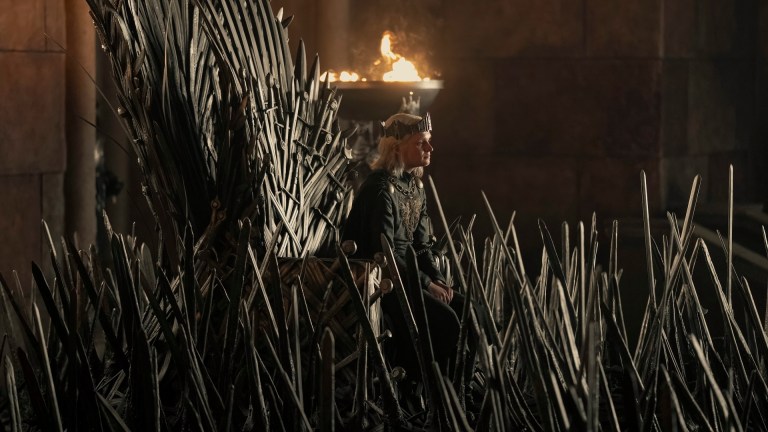House of the Dragon Season 2: King Aegon II Is Anything But Magnanimous
King Aegon II Targaryen (Tom Glynn-Carney) finds out that governing is hard - no matter what his supporters call him.

This article contains spoilers for House of the Dragon season 2 episode 1.
Midway through the House of the Dragon season 2 premiere, King Aegon II Targaryen (Tom Glynn-Carney) makes his way to the Iron Throne to do his kingly duties. As he approaches the baroque chair made of swords, his herald announces the king’s presence to the gathered smallfolk in grand fashion.
“All hail King Aegon! Aegon the Magnanimous! Second of his name! King of the Andals, and the Rhoynar, and the First Men! Lord of the Seven Kingdoms and Protector of the Realm!”
Ignoring the rest of the usual “King of the…” jargon, Aegon hones in on one portion of the sobriquet in particular. “The magnanimous?” he says to the herald with an eyebrow raised.
It’s clear that something about the word “magnanimous” has struck Aegon. Later on in the episode, as the assassins know as Blood and Cheese prowl through the castle, they come across a drunken Aegon sitting upon the Iron Throne and opining about his herald’s word choice yet again.
“I need a style that demonstrates power and commands respect. No one knows what magnanimous means,” he says.
Does no one know actually what magnanimous means? Or does Aegon just not know? According to Aegon actor Tom Glynn-Carney, it’s the latter.
“He’s never heard that word before,” Glynn-Carney tells Den of Geek and other outlets during a pre-season roundtable interview. “The sensation he gets from it is not one of great power and strength, which is what I think he wants.”
Despite not knowing its definition, Aegon might be hung up on the word “magnanimous” because part of him understands it’s one of the last words in the English canon (or the “Common Tongue” in a Game of Thrones context) that someone would use to describe him.
Magnanimous is just an awesome word. It’s an adjective originating from the 16th century that is used to describe someone as “nobly brave or brilliant” or as “great-souled.” My Western Civilization teacher in high school, the venerable Mr. Lally, highlighted magnanimous as being one of the most important concepts that people look for in their leaders. He applied the term to George Washington: Union Army general, first American president, and a man who was regarded as being “great in mind, soul, and spirit.”* To be magnanimous means to be generous or forgiving – particularly to a rival or a less powerful person. As such, the term itself suggests that the individual it applies to has power.
*Except for … you know, owning other human beings as chattel.
King Aegon II indeed has power, but does he have the generosity of spirit to be magnanimous? Interestingly enough, the first portion of season 2 episode 1 “A Son for a Son” implies that he just might! Aegon comes to his first petitioning session for the smallfolk of King’s Landing with more empathy than expected. He seems eager to make sure that farmers receive their livestock back and carpenters are properly compensated for their work. According to Glynn-Carney, that moment helps establish that Aegon isn’t the one-dimensional villain that Rhaenyra and the Blacks would make him out to be.
“There has to be some humanity to it,” he says. “It’s been great to have those flavors [to Aegon] this time. Should he have had a different upbringing, he may have been a wonderful, kind, fair, good person. But for whatever reason, we’ve gone on a different track.”
Of course, simply not being a villain is not enough to make one properly magnanimous. Aegon is easily bullied out of his charitable inclinations by his Hand Ser Otto Hightower (Rhyfs Ifans), who informs him that ceding any of the crown’s taxed livestock during a time of war and embargo is ill-advised.
A magnanimous ruler would go ahead and give the man his sheep back anyway. But of course, a magnanimous ruler then wouldn’t have enough meat to feed his dragons and armies. Perhaps that’s why we don’t have many magnanimous rulers to point to in our own histories in the first place.
New episodes of House of the Dragon season 2 premiere Sundays at 9 p.m. on HBO.
